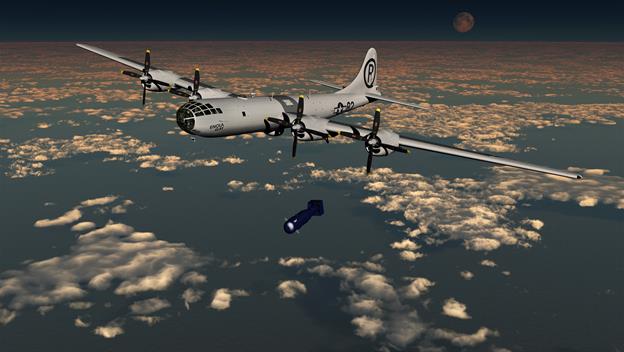 |
On 7 August 1945, at 0816 Japanese time, an American B-29 bomber, the Enola Gay, dropped the world's first atom bomb (photo) over the city of Hiroshima, Japan. Approximately eighty thousand people are killed as a direct result of the blast, and another thirty-five thousand are injured. At least another sixty thousand would be dead by the the end of the year from effects of fallout.
President Harry S. Truman, discouraged by the Japanese response to the Potsdam Conference’s demand for unconditional surrender, made the decision to use the atom bomb to end the war, in order to prevent what he predicted would be a much greater loss of life if the United States were to invade the Japanese mainland. On 5 August, while a “conventional” bombing of Japan was underway, Little Boy, (the nickname for one of two atom bombs available for use against Japan), was loaded onto Lieutenant Paul W. Tibbets’ plane on Tinian Island in the Marianas. Tibbets’ B-29, named the Enola Gay after his mother, left the island at 0245 on 6 August. Five and a half hours later, Little Boy was dropped, exploding two thousand feet over a hospital and unleashing the equivalent of twelve thousand tons of TNT. The bomb had several inscriptions scribbled on its shell, one of which read 'Greetings to the Emperor from the men of the Indianapolis', (the ship that had transported the bomb to the Marianas).
There were ninety thousand buildings in Hiroshima before the bomb was dropped; less than thirty thousand remained afterwards. Of the city’s two hundred doctors before the explosion; only twenty were alive or capable of working. There were eighteen hundred nurses before, but only a hundred and fifty remained who were able to tend to the sick and dying.
According to John Hersey’s classic work Hiroshima, the Hiroshima city government had put hundreds of schoolgirls to work clearing fire lanes in the event of incendiary bomb attacks, and they were out in the open when the Enola Gay dropped its load.
There were so many spontaneous fires set as a result of the bomb that a crewman of the Enola Gay stopped trying to count them. Another crewman remarked that “it’s pretty terrific. What a relief it worked.”
Rico says he's not sure Tibbets' mother would be happy to have the 'honor' of the connection... |
|

No comments:
Post a Comment
No more Anonymous comments, sorry.